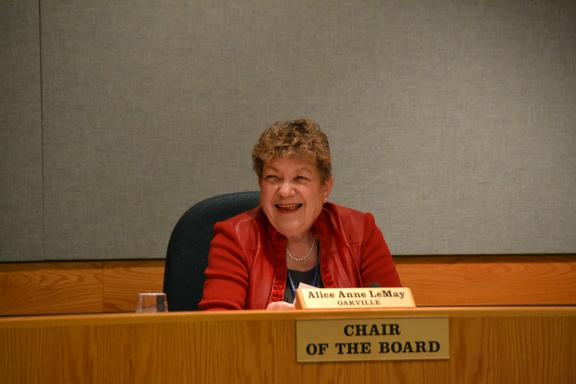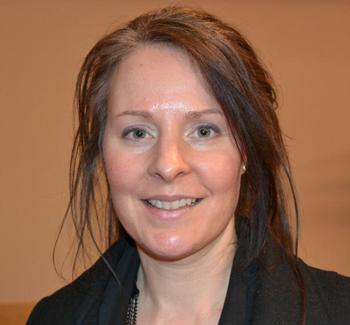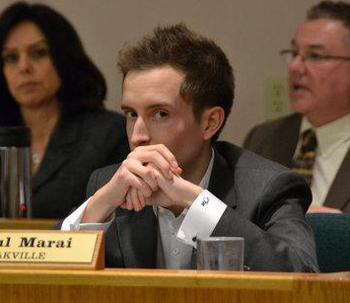
HCDSB chair Alice Anne LeMay. Credit: Andrea Houston

Sylvie Hache, a self-described "recovering homosexual," made a presentation to the Halton board. Credit: Andrea Houston
The Halton Catholic District School Board’s (HCDSB) new equity and inclusive education policy passed its first hurdle Feb 15, but the board still does not allow for any student group containing the word “gay.”
Instead, the board has included procedural supports that follow the Pastoral Guidelines to Assist Students of Same-Sex Attraction, a document written by the bishops and used to write the equity policy, as well as training for staff, educators and parents. The document explicitly prohibits gay sexual activity and states that if gays can’t live a “moral life,” they must accept “a life of chastity.” Sex is only for married straight couples.
“If a student asks for a gay-straight alliance [GSA], what will happen?” Paul Marai asked board chair Alice Anne LeMay during the meeting. She didn’t answer, saying only, “That’s not in the motion. Did you read the policy?”
The motion contains the Catholic template equity policy and a list of procedures dubbed “action steps.” It approves of By Your SIDE (Safety, Inclusively, Diversity, Equity) groups that would act as nonspecific equity clubs, encouraging students to discuss “all issues concerning equity, inclusively, diversity and safety.”
Marai pulls no punches on the By Your SIDE proposal. He says the board has just sidestepped the issue by approving another ban.
“I’m really worried we went from revoking a ban on GSAs to banning the word ‘gay,’” Marai tells Xtra. “What kind of message does this send to the [lesbian, gay, bi and trans] students at our schools?… We want students to congregate, but we don’t want them to be visible.”
The board will also get reports from these groups, brought back by student senate members and student trustees in the form of “recommendations.” The groups will be established in each secondary school.
Another support, SIDE Spaces, refers to training given to two staff members at each school, appointed by principals. The training includes the lessons in the Pastoral Guidelines. The board also plans to establish networks with other Catholic boards and community agencies to determine best practices.
The draft policy now goes out to the community for feedback, a process that will take about three weeks. Anyone can comment, says John Langill, superintendent of education for the HCDSB, “and everything is brought forward to the board.” He says the policy will be circulated among parents, students, teachers, priests, church councils and school administrators before returning to policy committee. It will go to final reading in April.
Anthony Danko was one of three trustees who voted against the policy. He expressed concern that the procedural supports were included with the policy. LeMay told him that, in light of “media reports,” they must be included. Neither Danko nor LeMay remained in the boardroom for comment.
The other trustees who voted against the policy were Marai and Jane Michael, “but for very different reasons,” Marai says. Michael did not remain behind either.
“Quite frankly, now we have a situation that has potentially created this umbrella [student group],” Marai says. “What does this mean for multicultural clubs? We don’t have any answers on that. I’m not sure what the outcome will be, and I’m very concerned about that.
“I really wish we had time to discuss the procedures specifically and our concerns about them.”
There was one shocking voice in opposition to the board’s new policy. Sylvie Hache, a self-described “recovering homosexual,” spoke at the beginning of the meeting.
The packed gallery sat in stunned silence as she argued that being gay is an addiction, something to be treated and cured, “like drug addiction.” She told the board to remove all references to “sexual orientation” because “it is sinful when acted upon.”
“The truth from the Bible stated homosexuality as a sinful behaviour equal to, but not any different from, any other sinful or addictive behaviour.” Hache added that she would rather see the board establish groups that help students “turn away from that sinful or addictive behaviour,” like drug rehabilitation or Alcoholics Anonymous.
Reading from a prepared response, LeMay thanked Hache for her presentation and said, “You do not accurately reflect the teachings of the church on homosexuality.” (Interestingly, it’s almost exactly what she told Xtra when she was asked about the board’s GSA ban back in January.)
Marai looked sickened by Hache’s speech.
“I was horrified with what she said. This is why [the board] isn’t going far enough with these SIDE Spaces,” Marai tells Xtra. “She’s a perfect example of why students, if they would like GSA clubs, they should be allowed to have them, because unfortunately there’s people like her in our society.”
The HCDSB made waves after they banned GSAs in November. When questioned, LeMay told Xtra the board “doesn’t allow Nazi groups either.” In the face of national outrage, the board was forced to lift the ban on GSAs.
It was a letter sent from Bishop Paul-André Durocher, chair of the Education Commission of the Assembly of Catholic Bishops of Ontario, to Catholic school boards that led to the ban in the first place. The letter raised concerns about the groups because they “imply a self-identification with sexual orientation that is often premature among high school students.”
Education Minister Leona Dombrowsky has not responded to repeated interview requests from Xtra.
Read read more of Xtra‘s coverage on Halton here.

 Why you can trust Xtra
Why you can trust Xtra


